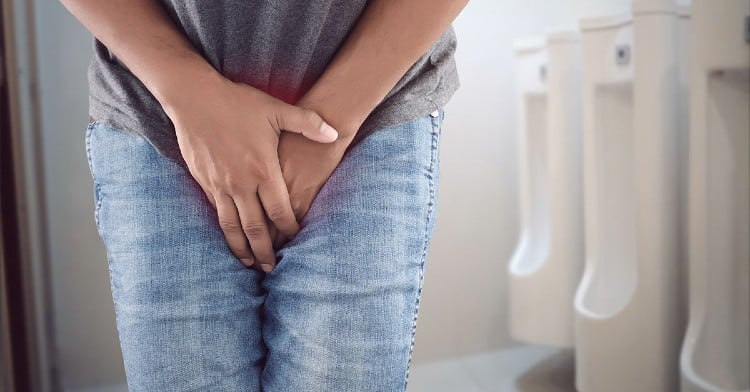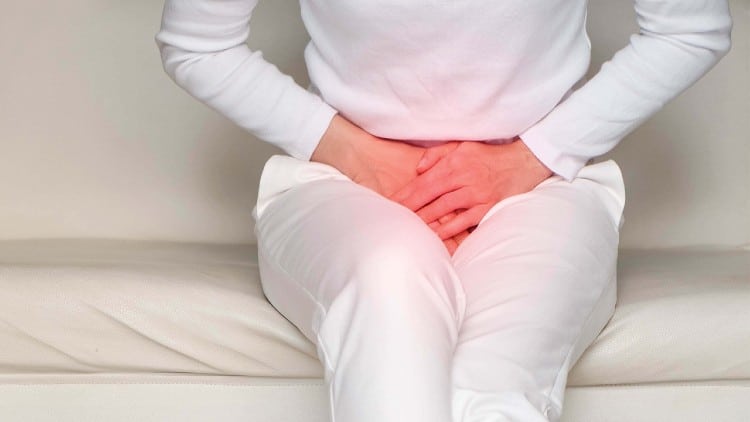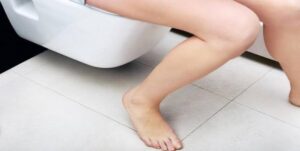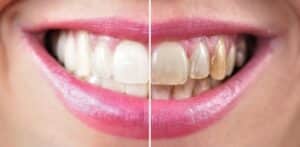The Best Fluffy Pancakes recipe you will fall in love with. Full of tips and tricks to help you make the best pancakes.

Leaking urine after urination can occur in women of all ages. It is a common problem that often occurs due to weak pelvic floor muscles, childbirth or menopause.

Stress urinary incontinence (SUI) is the most common type of leakage and it results when physical activity or an increase in abdominal pressure causes the bladder to leak urine unintentionally. This can happen during exercise, sneezing, coughing, and even laughing.
Treatments for leaking urine after urination vary depending on the severity of the condition, but they generally involve strengthening exercises for the pelvic floor muscles and lifestyle changes such as reducing fluid intake before bedtime or avoiding activities that put pressure on the bladder. In more severe cases, surgical interventions may be necessary.
There are also many products available that can help manage leaking urine after urination, such as pads, shields, and protective underwear. With the right treatment plan and lifestyle changes, you can reduce or even eliminate leaking urine after urination.
Leaking Urine After Urination Female: Urinary Incontinence And bladder Leak Treatment
There are a variety of treatments available for bladder leaks. Women with mild SUI may find relief using Kegel exercises, which strengthen the pelvic floor muscles and can help control urine leakage. Weight loss can also be helpful as it decreases abdominal pressure on the bladder.
In more severe cases, medications such as alpha-blockers or antimuscarinics may be prescribed to relax the bladder muscles and reduce leakage. In extreme cases, surgery may be necessary to repair damage to the pelvic floor muscles or urethra or to restore the normal functioning of the bladder.
It is important that you watch this video on best bladder leak treatment that works that will fix this issue once and for all.
if you are experiencing leaking urine after urination in order to determine an appropriate course of treatment. With proper diagnosis and treatment, bladder leaks can be better managed and even eliminated.
What could be the cause of leaking urine after urination female?
Leaking urine after urination or leaking urine without knowing it can be caused by a variety of factors, including weakened pelvic floor muscles, urinary tract infections (UTIs), overactive bladder syndrome, certain medications, pregnancy and childbirth, or menopause. If the problem persists, it is recommended to see a doctor for further assessment and treatment.
Treatment options can range from lifestyle changes such as exercising the pelvic floor muscles or behavioral therapy to medication or surgery. In more severe cases, reconstructive surgery may be necessary. It is important to seek professional help in order to determine the underlying cause of the issue and explore possible treatments accordingly.
How to treat the condition of Leaking Urine After Urination Female?
The most effective treatment for leaking urine after urination will depend on the underlying cause. Treatment options may include lifestyle changes such as exercising the pelvic floor muscles, behavioral therapy, medication (e.g. anticholinergics or anti-depressants), or surgery (e.g. reconstructive surgery).
In some cases, surgery may be necessary to correct structural problems in the urinary tract. It is important to consult a doctor to determine the best treatment approach and address any underlying medical conditions that may be contributing to the problem.
Additionally, cognitive behavior therapy can help individuals manage their symptoms more effectively and reduce stress levels associated with incontinence issues. Furthermore, tips such as avoiding caffeine and alcohol consumption can also help reduce incontinence symptoms. Finally, wearing protective pads and garments can help individuals manage the condition more comfortably.
Symptoms of urinary incontinence
Symptoms of urinary incontinence can vary from person to person, and seeking medical advice can help ensure that the right treatment is offered.
If urinary incontinence persists despite lifestyle modifications and medications, surgery may be considered as a last resort. In any case, it’s important to consult with your doctor in order to get the best treatment for your specific needs.
Having conversations about urinary incontinence can be embarrassing but it is crucial to ensure you are getting the best possible care. It is important to remember that urinary incontinence can be treated and managed, so don’t hesitate to ask for help. With the right treatment, you should be able to control your urine leakage and keep it under control.
Bladder Incontinence Causes Or Bladder Leakage Causes
Bladder incontinence or bladder leakage can have many causes, including weakened pelvic floor muscles, urinary tract infections (UTIs), overactive bladder syndrome, certain medications, pregnancy and childbirth, or menopause.
Other factors such as obesity, neurological disorders and constipation can contribute to the problem. Additionally, lifestyle choices such as smoking and excessive alcohol consumption may also increase a person’s risk of developing incontinence-related issues.
It is important to consult a doctor in order to determine the underlying cause of the condition so that an appropriate treatment plan can be developed. In some cases further testing may be necessary in order to rule out more serious medical conditions.
Treatment options will depend on the underlying cause and other individual factors. Possible approaches can include lifestyle modifications, bladder training exercises, medication or surgery. In more severe cases, reconstructive surgery may be necessary. It is important to seek professional help in order to determine the best course of action.
With proper treatment and lifestyle changes many people are able to effectively manage their symptoms and even eliminate them completely. If you are experiencing leaking urine after urination, it is important to consult a doctor in order to get an accurate diagnosis and develop an appropriate treatment plan. With the right care, you can start feeling better and enjoy life again!
How To Stop Male Urine Leakage after Urination
The first step to stop male urine leakage is lifestyle modification. Cutting down on caffeine, alcohol and high-sodium foods can help reduce the amount of urine released during urination. Additionally, staying hydrated by drinking more water can help reduce irritation in the urinary tract.
Exercising regularly may also help reduce the chances of urinary incontinence as well as improve overall health. Specific exercises such as Kegel exercises can target specific muscles that control urination and bladder control. Performing these exercises will strengthen pelvic floor muscles which helps to support the internal organs, including the bladder, for better urine control.
Medications or prescription drugs like alpha-blockers or 5-alpha reductase inhibitors have been proven to reduce the amount of urine leakage after urination. Additionally, some medications contain anticholinergics, which help relax urinary muscles and prevent overactive bladder symptoms.
Surgery can also be used for male urine leakage depending on the severity of the issue. A urologist may suggest surgery to support or reposition an overly active bladder muscle or to block nerve signals that are causing involuntary muscle contractions. A more invasive procedure may be necessary if there is a problem with the prostate gland.
Overall, lifestyle modifications and exercises may not completely prevent male urine leakage but they can certainly help reduce its occurrence. However, if these measures do not provide sufficient relief from symptoms, consulting with a doctor is recommended in order to determine the best course of treatment.
What are some tips to prevent leakage in women after urination?

There are several tips that can help women prevent leakage after urination when you are not able to empty your bladder, such as:
– Exercising the pelvic floor muscles regularly to increase strength and control.
– Avoiding constipation by eating a healthy diet with plenty of fiber and drinking enough fluids.
– Practicing relaxation techniques such as yoga or meditation to reduce stress levels associated with incontinence issues.
– Taking regular bathroom breaks to empty the bladder before it gets too full.
– Wearing protective pads and garments as necessary to manage symptoms more comfortably.
– Quitting smoking, if applicable, since smoking can worsen bladder problems.
– Limiting caffeine and alcohol consumption as these substances act as diuretics and can increase the need to urinate.
– Consulting a doctor or healthcare professional for further evaluation and treatment if necessary.
By following these tips, women can help reduce their risk of leakage after urination and manage their symptoms more effectively.
Home remedies that can help ease the symptoms of urinary incontinence
There are several home remedies that can help ease the symptoms of urinary incontinence, such as:
– Doing Kegel exercises regularly to strengthen the pelvic floor muscles which support the bladder and urethra.
– Practicing relaxation techniques such as yoga, meditation, or deep breathing to reduce stress levels associated with incontinence issues.
– Avoiding constipation by eating a healthy diet with plenty of fiber and drinking enough fluids.
– Taking regular bathroom breaks to empty the bladder before it gets too full.
– Limiting caffeine and alcohol consumption as these substances act as diuretics and can increase the need to urinate.
– Wearing protective pads and garments as necessary to manage symptoms more comfortably.
– Quitting smoking, if applicable, since smoking can worsen bladder problems.
– Consulting a doctor or healthcare professional for further evaluation and treatment if necessary.
By following these home remedies, individuals with urinary incontinence can help reduce their symptoms and improve the quality of their lives.
What is leaking urine after urination females and what are the causes?
Leaking urine after urination, also known as post-micturition dribble, is an involuntary leakage of urine following the completion of urinating. It is typically seen in both men and women, but it is more common in women due to anatomical differences such as shorter urethras which can lead to urine pooling in the bladder and urethral sphincter weakness.
The most common causes for leaking urine after urination include: weakened pelvic floor muscles, incontinence during pregnancy, urinary tract infections (UTIs), nerve damage or muscle weakness in the bladder or sphincter area, certain medications (e.g. anticholinergics or anti-depressants), enlarged prostate glands (in men only), and certain neurological conditions. Additionally, certain lifestyle factors can also contribute to this condition, such as smoking, heavy alcohol consumption, or inadequate hydration.
It is important to consult a medical professional if you are experiencing this issue in order to properly diagnose and treat the underlying cause of your symptoms.
Depending on the cause of urinary incontinence in women, treatment may involve pelvic floor exercises and muscle strengthening, physical therapy such as biofeedback or electrical stimulation of the bladder muscles, medications to control incontinence or UTIs, or even surgery for more severe cases.
How To Reverse Bathroom Urges: New found Discovery Turned My Life Around Watch Video
By addressing the cause of post-micturition dribble with an appropriate treatment plan, individuals can reduce their risk of further leakage after urination.
How to diagnose if you have a urinary tract infection (UTI)
If you suspect that you may have a urinary tract infection (UTI), it is important to seek medical attention as soon as possible in order to receive an accurate diagnosis and appropriate treatment. Diagnosing a UTI can be done with a variety of tests, such as:
– Urine culture test – this test takes samples of your urine which are then examined for the presence of bacteria.
– Urinalysis – this test checks for abnormalities in the color, clarity, or levels of proteins or white blood cells in your urine.
– Imaging studies – these can include ultrasound and CT scans to look for any structural issues in the bladder or kidneys that may be causing a UTI.
– Blood tests – these can check for any presence of infection in the bloodstream.
Top rated leaking urine without knowing it home remedies bladder leak treatment that works ask you to provide a complete medical history and discuss any recent symptoms that could point toward a UTI. It is important, to be honest, and detail your symptoms as accurately as possible so that the doctor can make an accurate diagnosis.
Once diagnosed, your doctor will be able to recommend a treatment plan based on what type of UTI it is and its severity. This may include antibiotics, changes in diet or lifestyle, or other medications depending on the level of infection.
By receiving proper medical care, individuals with UTIs can reduce their risk of further complications and achieve symptom relief quickly.
The best ways to treat UTIs Naturally
If you are looking to treat a urinary tract infection (UTI) naturally, there are several home remedies that can help reduce the severity of symptoms. These include:
– Drinking plenty of water – make sure to stay hydrated while treating your UTI in order to flush out bacteria from the body and reduce inflammation.
– Taking probiotics – some research suggests that taking probiotic supplements may help improve UTI symptoms by restoring healthy bacteria in the body.
– Eating cranberries or drinking cranberry juice – this is thought to be beneficial as cranberry juice contains compounds that may help prevent bacteria from attaching to bladder walls.
– Heating pads – applying heat to the lower abdomen can provide temporary relief from discomfort.
– Herbal supplements – some herbal remedies, such as uva ursi or buchu leaf extract, may also be helpful in treating UTI symptoms.
It is important to remember that although these home remedies can help alleviate UTI symptoms, they are not a replacement for seeking medical care and receiving an accurate diagnosis and recommended treatment plan from a healthcare professional.
If you suspect you have a UTI, it is best to consult a doctor right away in order to receive the necessary medications and advice on how to prevent further complications. By taking the proper steps in treating a UTI early on, individuals can reduce their risk of long-term bladder damage or other severe health conditions.
Preventing UTIs in the future
In order to prevent future urinary tract infections (UTIs), there are several steps that individuals can take. These include:
– Drinking plenty of water – staying hydrated helps flush out bacteria and keep urine diluted.
– Wiping front to back after using the restroom – this prevents bacteria from your rectum or anus from entering your urethra.
– Urinating before and after sex – this helps reduce the chance of bacteria entering the bladder through sexual intercourse.
– Avoiding douching and using scented feminine products – these can irritate the sensitive skin around your genitals, making it easier for bacteria to enter your urethra.
– Wearing cotton underwear – synthetic fabrics can trap heat and moisture, providing an ideal environment for bacteria to grow.
– Keeping the area around your urethra clean and dry – wash the skin near your genitals after you shower or bathe and make sure to completely dry off with a soft towel.
By following these simple steps, individuals can lower their risk of UTIs in the future and maintain their overall urinary health.
If you feel that you may be at a higher risk for UTIs due to other existing medical conditions, it is important to speak with your doctor about possible preventive measures as well. With proactive steps taken towards prevention, individuals can decrease their chances of recurring UTIs and lead healthy, happy lives.
Bladder Leak Treatment
In addition to treating urinary tract infections (UTIs), there are also treatments available for bladder leakage. Bladder control problems, also known as urinary incontinence, can be caused by a variety of factors such as weakened pelvic muscles due to pregnancy, the bladder doesn’t empty completely, childbirth or age-related changes, nerve damage, or other medical conditions.
Treatment options for overflow incontinence vary depending on the individual and may include medications to relax the bladder muscle, lifestyle changes such as quitting smoking or reducing caffeine intake, physical therapy exercises to strengthen the pelvic floor muscles, or surgery if deemed necessary.
If you’re struggling with bladder leakage and would like more information on treatment options, it is best to speak learn more about top rated bladder leak treatment that works the right course of action for you.
Best Supplements to Treat Leaking Urine After Urination Female
Leaking urine after urination, also known as urinary incontinence, is a common problem for women. While there are various treatments available for this condition, certain dietary supplements may provide natural relief from symptoms.
The following supplements have been found to help reduce leaking and improve urinary control:
– Cranberry – cranberry juice or capsules contain antioxidants that can help flush bacteria out of the bladder, reducing the chance of UTIs and improving bladder health.
– Vitamin C – vitamin C helps build collagen in the bladder and urethra, strengthening the muscles that help keep urine in the bladder until you’re ready to go to the bathroom.
– Magnesium – magnesium deficiency can cause weakened pelvic floor muscles, leading to a loss of bladder control. Taking magnesium supplements can help strengthen them and improve urinary incontinence.
– Saw Palmetto – saw palmetto contains phytosterols which have been found to reduce inflammation in the urethra, improving bladder strength and reducing leaks.
These supplements should only be taken with medical supervision or advice from a health care provider. Additionally, it’s important to discuss any risks or side effects associated with the supplement before taking it. With proper guidance, these dietary supplements may provide natural relief for women suffering from leaking urine after urination.
Best Practices for Preventing Urinary Tract Infections (UTIs)
Urinary tract infections (UTIs) can be painful and uncomfortable, so it’s important to take steps to prevent them. Here are some best practices for preventing UTIs:
– Drink plenty of water – staying hydrated helps flush bacteria out of your system.
– Wipe front to back after using the bathroom – this prevents bacteria from your rectum or anus from entering your urethra.
– Urinate before and after intercourse – this helps reduce the chance of bacteria entering the bladder through sexual intercourse.
– Avoid douching and using scented feminine products – these can irritate the sensitive skin around your genitals, making it easier for bacteria to enter your urethra.
– Wear cotton underwear – synthetic fabrics can trap
How To Reverse Bathroom Urges: New found Discovery Turned My Life Around Watch Video
Conclusion on Leaking Urine After Urination Female
Your urinary tract and bladder health are important parts of your overall wellbeing, and it’s essential to take steps to maintain them. By being aware of the potential causes of UTIs and bladder leakage, as well as understanding available treatment options, you can stay proactive in managing any issues that may arise.
If you are experiencing any symptoms or discomfort related to these conditions such as leaking urine without knowing it, here is best bladder leak treatment that works that will fix this issue once and for all.
With the right treatments and lifestyle changes, such as drinking plenty of water, wiping front to back after using the bathroom, avoiding douching and scented products, wearing cotton underwear, and taking dietary supplements as directed by a health care provider, you can decrease your chances of recurring UTIs and lead a healthy, happy life. Take charge of your health today!












